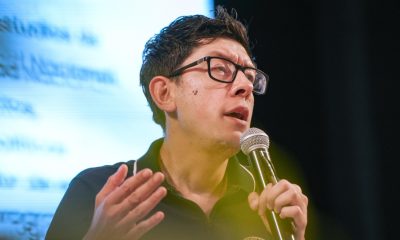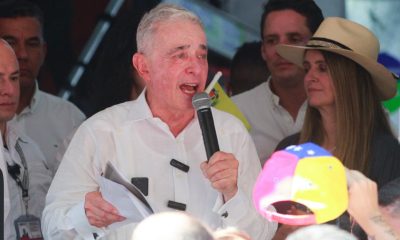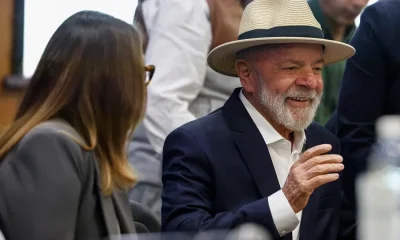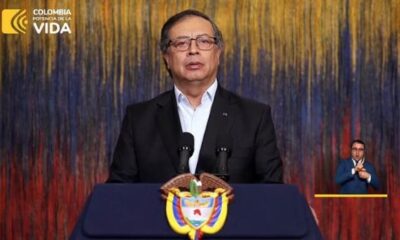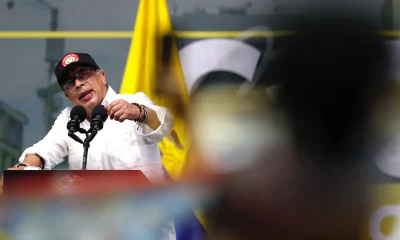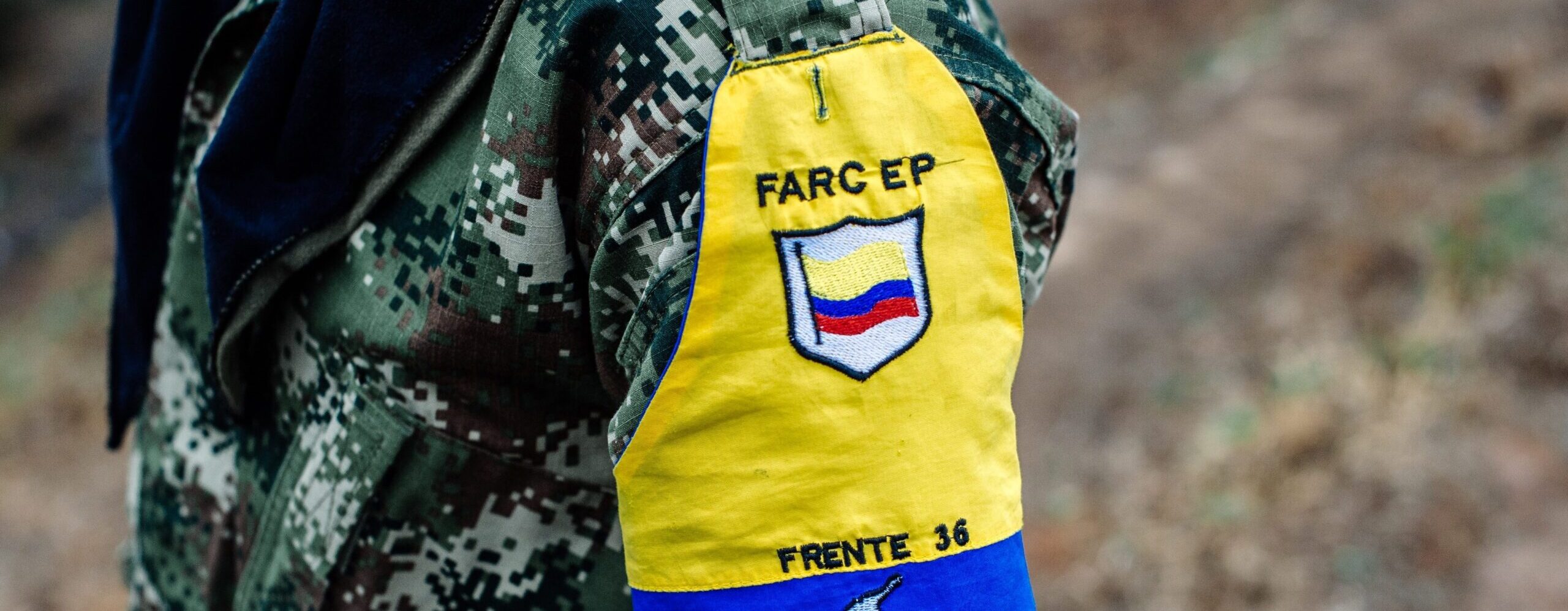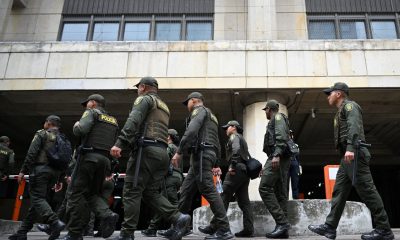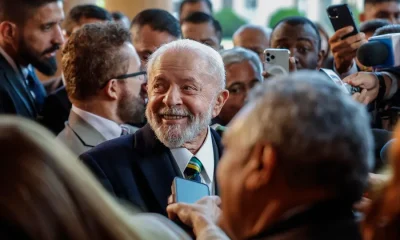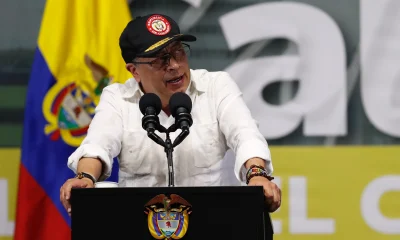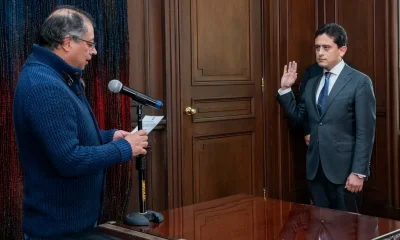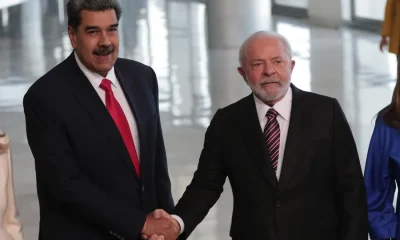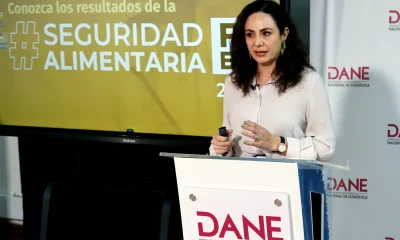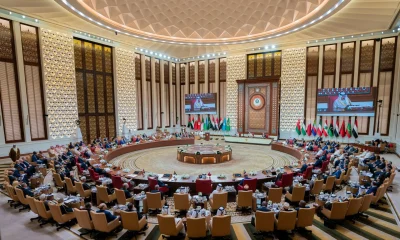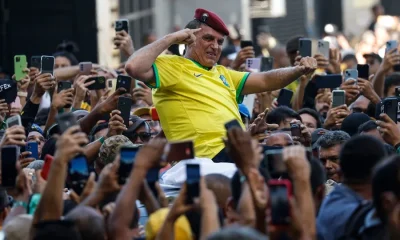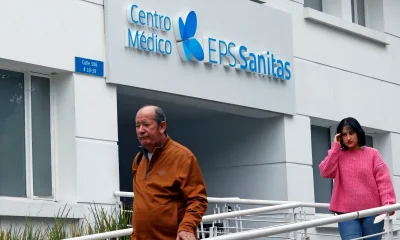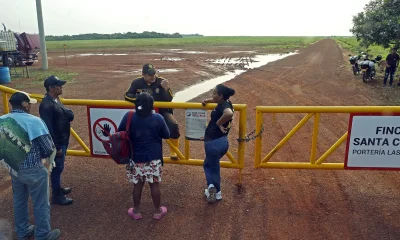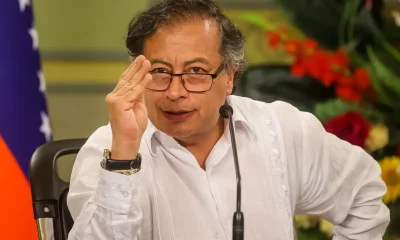International
Lula and Petro meet in Colombia’s presidential palace with the environment in the background
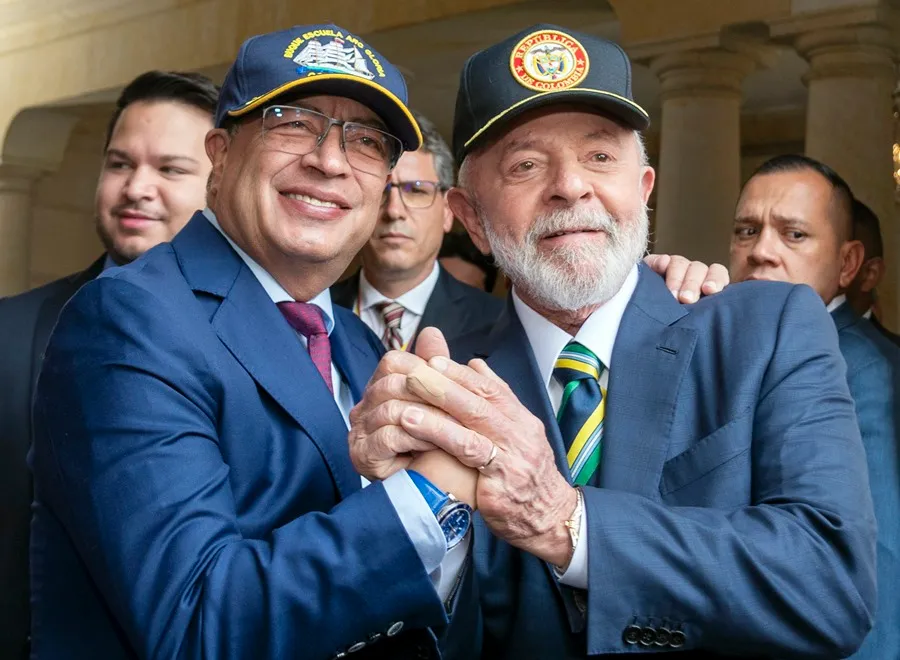
The president of Brazil, Luiz Inácio Lula da Silva, arrived at the Casa de Nariño in Bogotá to meet with his Colombian counterpart, Gustavo Petro, with whom he will talk about environmental cooperation, economic issues and also the Venezuelan situation.
Lula, accompanied by the First Lady of Brazil, Rosângela ‘Janja’ Lula da Silva, was received with military honors in the Plaza de Armas of the Colombian presidential palace.
However, he was not received by Petro in the outside courtyard of the palace, as usually happens, but the Colombian president waited for him at the door, next to the first lady, Verónica Alcocer.
The Brazilian and the Colombian, who have established themselves as the main South American leaders who defend the environment, will address “bilateral strategic issues, among others, the protection of the Amazon,” the Colombian Presidency reported.
Thus, on the table are issues of trade and investment, sustainable development and Amazon cooperation, social programs, human rights and family agriculture, among others.
“The delegations of the two governments will hold meetings to discuss specific issues of binational interest, such as the implementation of the Belém do Pará Declaration of 2023, pharmaceutical regulation, biooceanic corridors, tourism, homologation of university degrees and electrical interconnection,” said the Casa de Nariño.
It is expected that they will also combine visions about Venezuela since both countries have expressed their “concern” about the obstacles imposed for the registration of some opposition presidential candidacies in the face of the elections on July 28, but they do not consider that “isolating” that country is the answer.
“The regional situation is a mandatory issue” and the electoral process in Venezuela is “of interest to both countries,” said last week the director of the South American department of the Brazilian Foreign Ministry, João Queiroz.
Likewise, a road infrastructure plan proposed by Brazil to the countries of South America will be discussed, which aims at the construction of a wide road network and which has the endorsement of the main regional financial agencies.
The two presidents will also analyze commercial alternatives, both bilaterally and at the regional level, which include a push for the integration of South American production chains.
Brazil is today Colombia’s third largest trading partner, behind the United States and China, so the two governments intend to expand that exchange.
After the meeting and an official statement, both leaders will address a Brazil-Colombia Economic Forum, which will bring together 300 businessmen from both countries.
They will also inaugurate the XXXVI International Book Fair of Bogotá, one of the most relevant cultural events in Colombia and which is dedicated this year to Brazil.
International
U.S. Senate Rejects Budget, Bringing Government Closer to Shutdown Amid DHS Dispute

The U.S. Senate voted on Thursday against a budget proposal in a move aimed at pressuring changes at the Department of Homeland Security (DHS), following the killing of two civilians during a deployment of immigration agents in Minneapolis.
All Senate Democrats and seven Republican lawmakers voted against the bill, which requires 60 votes to advance, pushing the country closer to a partial government shutdown that would cut funding for several agencies, including the Pentagon and the Department of Health.
The rejection came as Senate leaders and the White House continue negotiations on a separate funding package for DHS that would allow reforms to the agency. Proposed measures include banning Immigration and Customs Enforcement (ICE) agents from wearing face coverings and requiring them to use body-worn cameras during operations.
The vote took place just hours after President Donald Trump said he was “close” to reaching an agreement with Democrats and did not believe the federal government would face another shutdown, following last year’s record stoppage.
“I don’t think the Democrats want a shutdown either, so we’ll work in a bipartisan way to avoid it. Hopefully, there will be no government shutdown. We’re working on that right now,” Trump said during a Cabinet meeting at the White House.
International
Trump Says Putin Agreed to One-Week Halt in Attacks on Ukraine Amid Extreme Cold

U.S. President Donald Trump said on Thursday that he secured a commitment from Russian President Vladimir Putinto halt attacks against Ukraine for one week, citing extreme weather conditions affecting the region.
“Because of the extreme cold (…) I personally asked Putin not to attack Kyiv or other cities and towns for a week. And he agreed. He was very pleasant,” Trump said during a Cabinet meeting broadcast by the White House.
Trump acknowledged that several advisers had questioned the decision to make the call.
“A lot of people told me not to waste the call because they wouldn’t agree. And he accepted. And we’re very happy they did, because they don’t need missiles hitting their towns and cities,” the president said.
According to Trump, Ukrainian authorities reacted with surprise to the announcement but welcomed the possibility of a temporary ceasefire.
“It’s extraordinarily cold, record cold (…) They say they’ve never experienced cold like this,” he added.
Ukrainian President Volodymyr Zelensky later commented on the announcement, expressing hope that the agreement would be honored.
International
Storm Kristin Kills Five in Portugal, Leaves Nearly 500,000 Without Power

Storm Kristin, which battered Portugal with heavy rain and strong winds early Wednesday, has left at least five people dead, while nearly half a million residents remained without electricity as of Thursday, according to updated figures from authorities.
The revised death toll was confirmed to AFP by a spokesperson for the National Emergency and Civil Protection Authority (ANPEC). On Wednesday, the agency had reported four fatalities.
Meanwhile, E-Redes, the country’s electricity distribution network operator, said that around 450,000 customers were still without power, particularly in central Portugal.
Emergency services responded to approximately 1,500 incidents between midnight and 8:00 a.m. local time on Wednesday, as the storm caused widespread disruptions.
The Portuguese government described Kristin as an “extreme weather event” that inflicted significant damage across several regions of the country. At the height of the storm, as many as 850,000 households and institutions lost electricity during the early hours of Wednesday.
Several municipalities ordered the closure of schools, many of which remained shut on Thursday due to ongoing adverse conditions.
Ricardo Costa, regional deputy commander of the Leiria Fire Brigade, said residents continue to seek assistance as rainfall persists.
“Even though the rain is not extremely intense, it is causing extensive damage to homes,” he noted.
In Figueira da Foz, a coastal city in central Portugal, strong winds toppled a giant Ferris wheel, underscoring the severity of the storm.
-

 International3 days ago
International3 days agoU.S. Senate Rejects Budget, Bringing Government Closer to Shutdown Amid DHS Dispute
-

 International4 days ago
International4 days agoFootball Fan Killed in Clashes After Colombian League Match
-

 Central America4 days ago
Central America4 days agoGuatemala President Says Starlink Terminal Found Inside Prison
-

 International4 days ago
International4 days agoRubio Says U.S. Could Participate in Follow-Up Russia-Ukraine Talks
-

 International4 days ago
International4 days agoMissing Spanish Sailor Rescued After 11 Days Adrift in Mediterranean
-

 Central America2 days ago
Central America2 days agoPanama Supreme Court Strikes Down Panama Ports Concession as Unconstitutional
-

 International3 days ago
International3 days agoStorm Kristin Kills Five in Portugal, Leaves Nearly 500,000 Without Power
-

 Central America2 days ago
Central America2 days agoU.S. and Guatemala Sign Trade Deal Granting Zero Tariffs to Most Exports
-

 International3 days ago
International3 days agoMan Arrested After Vehicle Crashes Into Jewish Institution in Brooklyn
-

 International3 days ago
International3 days agoTrump Says Putin Agreed to One-Week Halt in Attacks on Ukraine Amid Extreme Cold
-

 Central America7 hours ago
Central America7 hours agoCosta Rica Goes to the Polls as Voters Choose Continuity or Change































